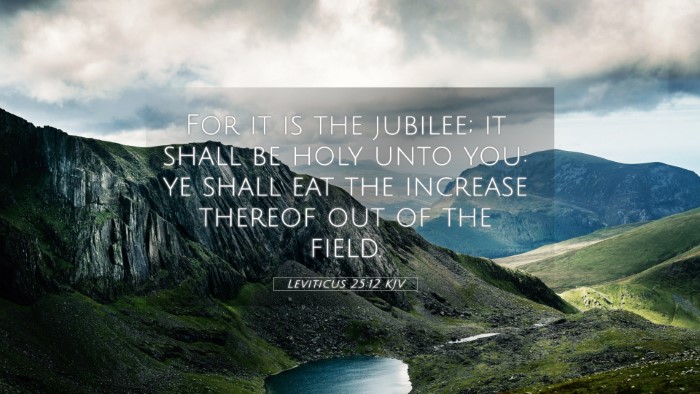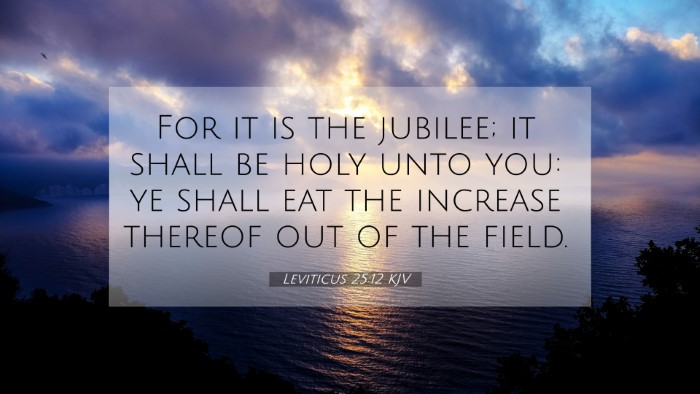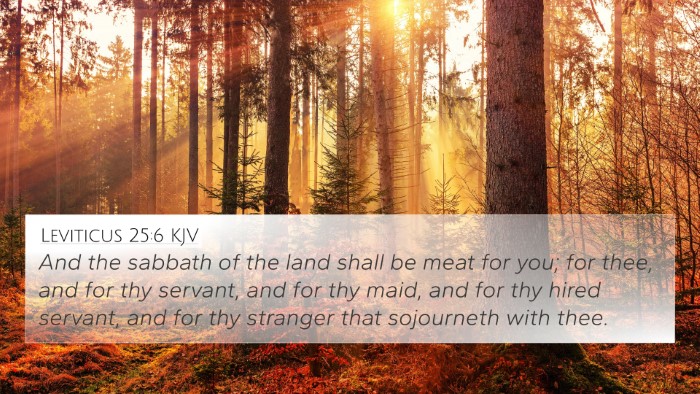Understanding Leviticus 25:12
Leviticus 25:12 states: "For it is the jubilee; it shall be holy unto you: ye shall eat the increase thereof out of the field."
This verse is part of a broader context that discusses the Year of Jubilee, a time of restoration and celebration among the Israelites.
Verse Meaning and Summary
This verse emphasizes the sacredness of the Jubilee year, describing it as a holy time when the land is to rest and the resources within it are to be shared among the community. The connection to holiness signifies that this period is to be regarded with reverence, dedicated to God and His laws.
Commentary Insights
-
Matthew Henry: Henry underscores the importance of the Jubilee as a divine ordinance meant to maintain equality and justice in society. He interprets the phrase "holy unto you" as an invitation for the Israelites to treat this time with dedicated joy and gratitude towards God.
-
Albert Barnes: Barnes points out that Jubilee represents not only a physical release from debts but also a spiritual restoration. The people are to eat freely from their fields, indicating a time of abundance provided by God, which connects to His provision for His people.
-
Adam Clarke: Clarke highlights the significance of the term "increase thereof". He suggests it symbolizes the blessings from God during the Jubilee year, reinforcing the idea that acknowledging God’s provision leads to communal responsibility for one another.
Thematic Connections and Bible Cross-References
Leviticus 25:12 is intricately connected to several key themes in the Bible, including social justice, restoration, and divine provision. The following scripture references enhance understanding of this verse:
- Exodus 23:11: Discusses the importance of allowing the land to rest and the provision of food for the poor.
- Deuteronomy 15:1-2: Outlines the cancellation of debts during the seventh year, echoing Jubilee themes of release.
- Isaiah 61:1-2: Proclaims the year of the Lord’s favor, resonating with the Jubilee message of restoration and liberty.
- Luke 4:18-19: Jesus refers to Isaiah’s proclamation, reflecting the spiritual significance of Jubilee in His ministry.
- Matthew 6:31-33: Highlights God’s provision for His people, connecting to the abundance experienced during the Jubilee.
- Romans 8:21: Speaks to the liberation of creation, similar to the release represented in the Year of Jubilee.
- 2 Corinthians 9:6-8: Encourages generosity, linking to the communal sharing concept in Jubilee.
Practical Applications and Study Tools
To fully appreciate the implications of Leviticus 25:12, consider employing various tools for Bible cross-referencing. These resources can aid in exploring the connections between Bible verses:
- Utilize a Bible concordance to find related verses.
- Engage with a Bible cross-reference guide to uncover thematic links.
- Explore cross-reference Bible study for comprehensive understanding.
- Learn how to use Bible cross-references effectively in your personal study.
- Use a Bible cross-reference system to enhance your scriptural insights.
- Employ cross-referencing Bible study methods for deeper analysis.
Conclusion
Leviticus 25:12 calls for reflection on God’s commandments regarding communal welfare and rest. By understanding its significance within the larger narrative of the Bible, one can appreciate the call to justice, mercy, and divine provision that transcends generations. The verse stands as a reminder of God’s intent for a society marked by equality and generosity, inviting believers to engage in inter-Biblical dialogue as they seek to apply His truths in their lives.



